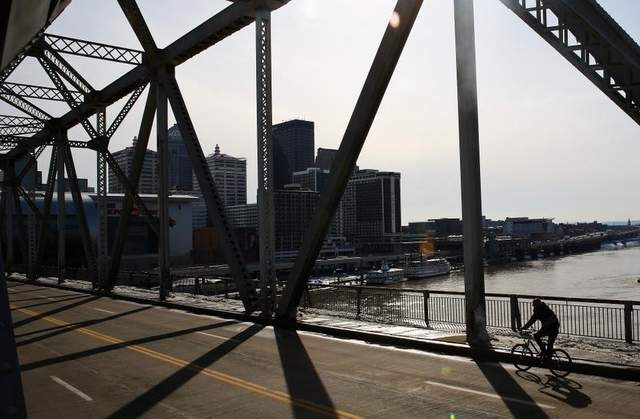UPDATE (3:38 p.m. Friday March 7): The state of Kentucky announced today it will allow pedestrians on the Clark Memorial Bridge after all, according to media reports that came out shortly after this article was published. Officials have modified the construction plan to allow one sidewalk to remain open for the next few months. “We heard people’s concerns about the loss of pedestrian access, and we have responded,” said Andy Barber, project manager for the Kentucky Transportation Cabinet, according to the Louisville Business Journal. Well done, Kentucky! We stand corrected on the statements made in the original article that follow:
In Louisville, it seems, nothing is nearly as important to the state government as cramming more cars through town. Ignoring strong grassroots opposition, Kentucky is currently moving forward on an absolutely enormous $2.6 billion highway bridge replacement and interchange widening project that will take years to complete and weaken downtown neighborhoods.

But for the people who walk or ride their bikes along that route? They should probably start looking for a new way to get to work. That was the message from leaders of the "Downtown Bridge Project" this week.
According to the Courier Journal, the sidewalks and two outer "shared" lanes of the Clark Memorial Bridge over the Ohio River to downtown Louisville will be closed for construction next week and won't be reopened until July. (The bridge will be totally closed to all traffic for six weeks, beginning in May.)
The only alternative route for walking and biking, the Big Four Bridge, is behind schedule and not yet open to pedestrians and cyclists.
Max Rowland, a project manager with Walsh Construction, the firm doing the Clark Memorial Bridge work, said during the lane closures the bridge will be "unsafe for pedestrian traffic.”
Meanwhile, Mindy Peterson, a spokesperson for the downtown bridge project, said signs will be installed that tell bicyclists to merge into the two remaining lanes. But she doesn't recommend it herself, telling the paper “it’s not a good spot for bicyclists to be."
Local active transportation advocate Jackie Green told the paper that multiple walking protests over the bridge were planned to draw attention to the closure. Local cyclists have also appealed to the Federal Highway Administration for help, the Courier Journal reports. But according to the paper, the feds just deferred to state transportation officials.





